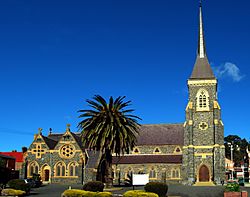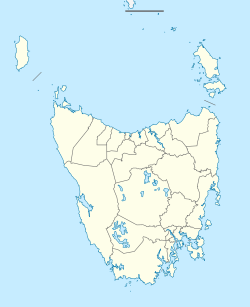Church of the Apostles, Launceston facts for kids
Quick facts for kids Church of the Apostles |
|
|---|---|
| Church of the Twelve Apostles | |
 |
|
| 41°26′33.9″S 147°8′1.7″E / 41.442750°S 147.133806°E | |
| Location | 44 Margaret Street, Launceston, Tasmania |
| Country | Australia |
| Denomination | Catholic |
| History | |
| Status | Parish church |
| Dedication | Mary, Queen of the Apostles |
| Consecrated | 7 November 1866 |
| Architecture | |
| Architect(s) | Henry Hunter, Alexander North, Peter Staunton |
| Style | Gothic Revival |
| Years built | 1866 (nave and aisles) 1888 (transept, sanctuary & sacristies) 1989 (bell tower & spire) |
| Groundbreaking | 15 September 1864 |
| Administration | |
| Parish | Launceston Parish |
| Archdiocese | Archdiocese of Hobart |
The Church of the Apostles is a beautiful Catholic church located in Launceston, Tasmania. It's a special place of worship for the Catholic community there. This church is part of the Archdiocese of Hobart.
Contents
The Church's Story
First Churches in Launceston
Before the Church of the Apostles was built, Catholics in Launceston needed a place to worship. In 1838, a temporary chapel was set up on Cameron Street. It was the first fixed place for the Catholic community in the city.
That same year, the government gave the Catholics some land. This land was on Margaret Street, near Cataract Hill. They planned to build a permanent church there. This new chapel was named after Saint Joseph.
The first stone for St. Joseph's Church was laid on March 19, 1839. It was officially opened in October 1842. After about twenty years, St. Joseph's Church started to get old. So, people decided to build a bigger, newer church in its place.
Building the Church of the Apostles
The plans for the new church were drawn by a Tasmanian architect named Henry Hunter. The first stone for this new church was laid on September 15, 1864. Bishop Willson led this important event.
By October 1866, the main part of the church, called the nave, and its two side sections, called aisles, were finished. On November 7, 1866, the church was officially opened for services. Bishop Murphy of Hobart led the opening ceremony. The church was dedicated to Mary, Queen of the Apostles.
The northern part of the church was built later. This section includes the transept, sanctuary, and sacristies. Bishop Murphy laid the foundation stone for this part on June 17, 1888. By then, Henry Hunter had moved away. So, another architect named Alexander North took over the project.
A foundation stone for the church tower was laid in May 1889. However, the tower and its tall spire were not finished until a century later. Melbourne architect Peter Staunton designed the bell tower and spire. They were finally added in 1989.
Inside the church, you can still see the original stone altar. The pulpit, where sermons are given, is made from special Australian woods. These include blackwood and huon pine. Timothy Earley crafted this beautiful pulpit. The church also has a large pipe organ. It is split into two parts on either side of the church. This organ was first used in 1933.
Gallery
 | Emma Amos |
 | Edward Mitchell Bannister |
 | Larry D. Alexander |
 | Ernie Barnes |







